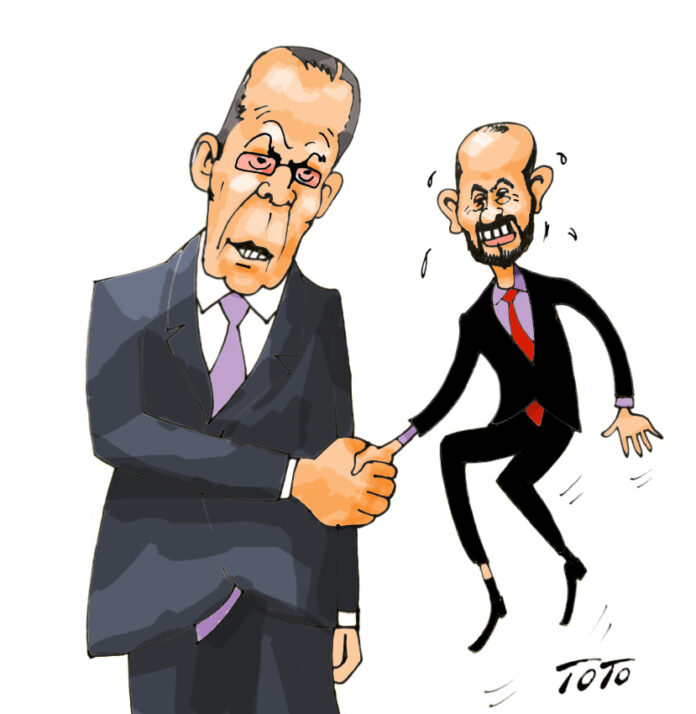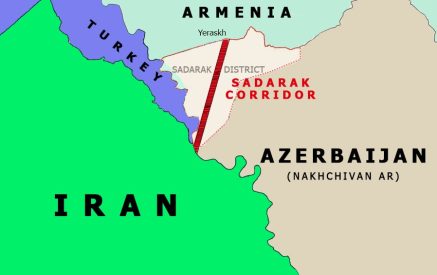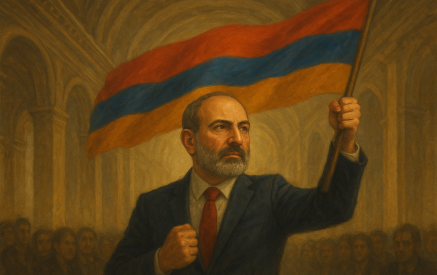by Edmond Y. Azadian
Russian Foreign Minister Sergei Lavrov’s transformation from posing as a strategic ally of Armenia to that of a sworn enemy has spanned a spectacular political trajectory over the last two years, since the 44-Day War, which Azerbaijan waged against Armenia in 2020, with the active participation of the Turkish army, Israeli drones, Pakistani pilots and Islamist jihadist mercenaries.
That war blew the cover of mystery draped over the strategic partnership between Armenia and Russia, as the latter failed in its treaty obligations towards Armenia, and thus it has been trying to find justification for that failure through intense verbal gymnastics.
Read also
The Armenian-Russian strategic partnership was based on the mutually exclusive paradigm of two axioms, which eventually collided to reveal its false pretenses in the cold light of day. On the one side, Moscow has taken for granted that it can drag Armenia in any direction it needs as a foot soldier, even where Armenia’s sovereignty is threatened. This cavalier attitude was manifested by President Vladimir Putin’s megaphone Alexander Lukashenko, the Belarusian dictator, who in February 2022 contemptuously pronounced at a meeting of the Collective Security Treaty Organization (CSTO), a Russian-centered security organization of which Armenia is a fellow member along with Belarus, “Armenia has nowhere to go. Who needs Armenia?”
The other axiom, from the Armenian perspective, was that Armenia did not need a military doctrine, or for that matter, any other strategic partner, as long as it relied on Russia. However, the political trends in the region evolved in different directions and Russia’s interests became aligned with those of Azerbaijan and Turkey, rendering Armenia the outlier. As a result, a crisis developed between Russian-Armenian relations, as the latter sought help elsewhere to shore up its security.
Mr. Lavrov assured Armenia during a press conference in Yerevan in July that roads and communication lines which will be built or unblocked will operate exclusively under the jurisdiction of the states through which they run. He was referring to the “Zangezur Corridor” through Armenia’s Syunik province, which has become a cause célèbre for Turkey and Azerbaijan, to link Baku with Nakhichevan. That same statement was publicly made by Russia’s Deputy Prime Minister Alexi Overchuk, who is part of a team of deputy prime ministers, including those of Armenia and Azerbaijan, tasked with working on the demarcation of the borders between the latter two.
Recently, however, the Russian side has maintained that instead of Armenia, Russia should manage the “Zangezur Corridor.”
Now, after Moscow’s failure to prevent the 44-Day War or provide the succor it was legally obligated to do, comes the crisis of the Lachin Corridor, which through the declaration of November 9, 2020, came under Russian jurisdiction as an extra-territorial passageway.
Following the blocking of this sole road connecting Armenia and Artsakh on December 12, certain actions and counteractions pushed Mr. Lavrov into a corner, where he finally justified Azerbaijan’s war against Armenia during an interview this week on Russian television. The dénouement did not come suddenly and it had been expected.
Last September, Mr. Lavrov had invited the foreign ministers of Armenia and Azerbaijan to hold negotiations in Moscow. Armenia’s Foreign Minister Ararat Mirzoyan refused to participate on the grounds that he was too busy with the Lachin Corridor crisis. Mr. Lavrov took the opportunity to lambaste the Armenian side, saying it had missed a valuable opportunity to seal a peace deal with Azerbaijan, and together with Mr. Jeyhun Bayramov, the Azerbaijani foreign minister, they turned the forum into an anti-Armenian blame game, as if some half dozen prior meetings in similar formats had produced any results.
At all these previous gatherings, the foreign ministers had just spun their wheels and returned home empty-handed. This particular meeting in Moscow had been scheduled to deny the limelight to Brussels, which had been taking the lead in negotiations.
The other area of contention was Armenia’s appeal to the International Court of Justice, also known as the World Court, accusing Azerbaijan of racism and ethnic cleansing in Karabakh. This appeal did not jibe well with the Kremlin’s policies. But Armenia has made headway at the court as Azerbaijan’s counterarguments were shredded and a positive verdict is anticipated soon.
The last CSTO meeting in Yerevan was another opportunity for a confrontation between Armenia and Russia, as Moscow was pushing Armenia to sign the final statement of the meeting, which Pashinyan refused. The confrontation further escalated when Armenia refused to host CSTO military drills on its territory this year.
The reason Pashinyan refused to sign the document was that it did not name Azerbaijan as the aggressor in the war, and in addition, the participants failed to recognize Armenia’s border with Azerbaijan.
Mr. Lavrov, a veteran of diplomacy, in his eloquent way, tried to blame Armenia for refusing to host CSTO observers on its territory, when the CSTO is by definition not a monitoring group, but a military alliance bound to defend its members. Armenia said thanks, but no thanks. Certainly the group had numerous chances — as well as signed obligation — to help Armenia during the disastrous war. They instead twisted and turned their statement of purpose and watched from the sidelines as Armenia was pummeled and Karabakh occupied. Indeed, most of the members of CSTO, particularly Belarus, Kazakhstan, Kyrgyzstan, Tajikistan congratulated President Ilham Aliyev on his “victory” against Armenia. Additionally, Kazakhstan, in particular, last week took part in wargames headed by Turkey and Azerbaijan, in Kars, near Armenia’s borders.
Mr. Lavrov has taken the European Union (EU) monitors’ presence on Armenian-Azerbaijan border more painfully. Last year the EU stationed 40 civilian monitors on Armenia-Azerbaijan border. Azerbaijan did not admit them on its territory, but took their presence under advisement.
Last year’s 40 monitors could not deter a massive aggression, but they played a restraining role as witnesses on the border. And indeed, their presence discouraged any escalation. This time around, based on last year’s experience, the EU has been stationing 100 monitors for a two-year period. Their number could rise to 200 to include 70 French gendarmes who will carry light weapons.
Incidentally, the EU monitors have been stationed on the Georgia-Russia border since 2008 and the border has remained quiet.
President Aliyev has argued against the stationing of the EU monitors. But Mr. Lavrov, assuming Azerbaijan’s advocacy, has carried the argument further by stating that without Azerbaijan’s consent, this move could prove to be “counterproductive,” which is a veiled threat against Armenia. That means Russia is up to mischief to disrupt the stationing of the EU monitors. Sure enough, this veil fell apart last week, when Russia announced that it was moving the joint Turkish-Russian monitoring center in Shushi (now called Shusha) near Armenia’s border in Azerbaijan.
We must remember that Russia’s Defense Minister Sergei Shoigu in 2020 was bragging about this joint monitoring station as a “brilliant arrangement with Turkey.”
Mr. Lavrov has grumbled over the fact that Armenia has refused to invite within its borders the Trojan horse that he had offered. He has said that CSTO is ready to send its monitors, “even within days, but our Armenian colleagues preferred to invite EU monitors.”
Russia would prefer to maintain Armenian-Azerbaijani relations under its control to keep the crisis percolating, in perpetual need of a stabilizer.
The EU monitors are security assets for Armenia to gave it some breathing room to recover from the devastation of war. But Russia perceives the move differently and accuses Armenia of inviting Western forces into the Caucasus region to push out Russia from its zone of influence. Armenia’s intent certainly is not that, but its very urgent defense against the existential threat that it faces.
Mr. Lavrov, unable to defend his country’s catastrophic failure to defend its allies, has thrown the most potent political bomb in his arsenal by justifying Azerbaijan’s criminal actions and turning realities upside down. What makes this betrayal even more painful for Armenia and the Armenian nation worldwide is that Lavrov himself is of Armenian extraction.
Indeed, on February 2, Mr. Lavrov gave an interview to Dmitri Kisselev on Rossya 24 and among other things, he stated, “For many years, Armenia occupied seven regions of Azerbaijan. Russia offered numerous options for a diplomatic solution. But the Armenian leadership wanted to keep the territories. Azerbaijan, exasperated, took back the lands that belong to it,” he said.
“Now, the parties have signed an agreement on their readiness to conclude a peace agreement on the basis of the 1991 Almaty Declaration. It states that the borders of independent states will run along the borders of the Union Republics. Karabakh was part of the Azerbaijan SSR.”
As a skilled diplomat Mr. Lavrov is entitled to lie to his heart’s content, but he cannot turn history upside down and shy away from Russia’s obligations:
- Russia was obligated to prevent the 44-Day War and not to ask for gratitude from Amenia for stopping it.
- Russia betrayed Armenia by supplying it with faulty armaments and refusing to deploy the air defense system.
- “Russia offered numerous options for a solution. But the Armenian leadership wanted to keep the territories.” This statement defies the facts because Russia encouraged Armenian leaders to continue to hold those territories as a bargaining chip in Kremlin’s hand against Azerbaijan. A case in point is that in 2012, Armenia was negotiating a deal with the EU but then Premier Serzh Sargsyan’s arm was twisted, and overnight, he turned the tide and Armenia abandoned the EU to opt for CSTO. Therefore, Moscow had the power to impose any solution it desired.
- Russia has subscribed to the principles of the Organization for Security and Cooperation in Europe (OSCE), which are based on three elements: The refusal to solve conflicts through the use of forces, maintain territorial integrity of nations and the minority’s rights for self-determination. By justifying Azerbaijan’s armed aggression against Armenia, Mr. Lavrov’s tramples the first of the OSCE principles.
- “Karabakh was part of the Azerbaijan SSR” is a misstatement because Karabakh was an autonomous region placed arbitrarily under Azerbaijan’s tutelage by Stalin, against the will of the population. Then Karabakh used the same constitutional mechanism as Azerbaijan to cede from the Soviet Union.
Armenians traditionally have proven to be a pro-Russian people. The recent change in public sentiment is the direct result of Russian actions, not necessarily the result of efforts from the West.
It is obvious that at the present time, Armenia and Russia are on a collision course. Armenia cannot push its luck too far, because Russia has the means and the will to react.
Just last week, a very articulate diplomat, Armen Kharazyan, promoting pro-Western policy for Armenia, mysteriously died. Speculations indicate that this is the beginning of things to come.
Prudence and caution are most valuable political assets at this time.



























































